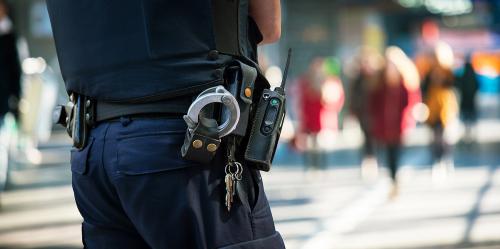Police across the United States are increasingly relying on emerging technologies to make their jobs more efficient and to increase public safety. Police are using drones, license plate readers, gunshot detection systems and even robots to reduce injury and harm. To no one’s surprise, law enforcement agencies have struggled with retention and hiring during the last two years, and many police departments are now looking to new technologies to fill those gaps and keep their communities safe. However, with these new technologies comes concern for the loss of privacy. Technology can be a great law enforcement tool; however, a line should be drawn to protect our privacy, while also meeting the expectation that the police will protect the public. Nevertheless, new technologies continue to find their way into law enforcement.
In Mountain View, California the police use two drones that have helped officers mitigate many dangerous situations, conduct search efforts and locate weapons. As a result, the department is looking to expand the program to include more drones with improved features such as longer flight time, higher video quality, and infrared capabilities, which help detect body heat. A drone can be a tool that not only helps accomplish current police goals, but also offers the potential to do the work better, more safely, and more efficiently. The key to accepting these technological advances is transparency with the public to let people know how and when the technology will and will not be used.
Beyond drones, police departments across the country have been using other kinds of technology to secure cities and towns. For example, ShotSpotter is a gunshot detection system that alerts polices to gunfire within the device’s specific coverage area by using sensors and algorithms to determine which loud bangs are likely gunshots. Within just 60 seconds, ShotSpotters can alert police to the precise location in which the gunshots were heard. By using these systems, police can more efficiently deploy their resources. This is a great benefit for cities that have had to cut back on neighborhood patrols due to officer shortages.
Some police departments have also started using Coplogic, which is an incident-reporting software. The software platform allows community members to submit crime reports for minor incidents, which in turn helps to free up officers’ time to focus on other, more serious crimes and incidents.
Police are even using robots to assist in carrying out their duties. For example, the New York City Police Department started using a robotic dog to help with surveillance and dangerous situations. The robot, Spot, weighs about 70 pounds and is able to climb stairs, easily walk through loose gravel, and carry up to 30 pounds of equipment while using its built-in cameras to survey the area. However, residents pushed back at the additional surveillance by Spot and the department stopped using it. This example reinforces the idea that education and transparency with new technologies are vital to the success of these programs and the use of technology among law enforcement.
For now, police departments will continue to navigate the use of new technologies through research and community involvement and input in the cities they serve.
About this Author
Kathryn Rattigan is a member of the firm’s Business Litigation Group and Data Privacy + Cybersecurity Team. She advises clients on data privacy and security, cybersecurity, and compliance with related state and federal laws. Kathryn also provides legal advice regarding the use of unmanned aerial systems (UAS, or drones) and Federal Aviation Administration (FAA) regulations. She represents clients across all industries, such as insurance, health care, education, energy, and construction.
Kathryn helps clients comply…

You are responsible for reading, understanding and agreeing to the National Law Review’s (NLR’s) and the National Law Forum LLC’s Terms of Use and Privacy Policy before using the National Law Review website. The National Law Review is a free to use, no-log in database of legal and business articles. The content and links on www.NatLawReview.com are intended for general information purposes only. Any legal analysis, legislative updates or other content and links should not be construed as legal or professional advice or a substitute for such advice. No attorney-client or confidential relationship is formed by the transmission of information between you and the National Law Review website or any of the law firms, attorneys or other professionals or organizations who include content on the National Law Review website. If you require legal or professional advice, kindly contact an attorney or other suitable professional advisor.
Some states have laws and ethical rules regarding solicitation and advertisement practices by attorneys and/or other professionals. The National Law Review is not a law firm nor is www.NatLawReview.com intended to be a referral service for attorneys and/or other professionals. The NLR does not wish, nor does it intend, to solicit the business of anyone or to refer anyone to an attorney or other professional. NLR does not answer legal questions nor will we refer you to an attorney or other professional if you request such information from us.
Under certain state laws the following statements may be required on this website and we have included them in order to be in full compliance with these rules. The choice of a lawyer or other professional is an important decision and should not be based solely upon advertisements. Attorney Advertising Notice: Prior results do not guarantee a similar outcome. Statement in compliance with Texas Rules of Professional Conduct. Unless otherwise noted, attorneys are not certified by the Texas Board of Legal Specialization, nor can NLR attest to the accuracy of any notation of Legal Specialization or other Professional Credentials.
The National Law Review – National Law Forum LLC 3 Grant Square #141 Hinsdale, IL 60521 Telephone (708) 357-3317 or toll free (877) 357-3317. If you would ike to contact us via email please click here.
Author Profile
Latest entries
 राशीफल2024.04.18आज का राशिफल 18 अप्रैल 2024: मेष, कर्क और वृश्चिक राशि के जातकों को धन लाभ के योग हैं, जानिए बाकी राशियों का कैसा रहेगा दिन – GNTTV
राशीफल2024.04.18आज का राशिफल 18 अप्रैल 2024: मेष, कर्क और वृश्चिक राशि के जातकों को धन लाभ के योग हैं, जानिए बाकी राशियों का कैसा रहेगा दिन – GNTTV लाइफस्टाइल2024.04.18मेरी क्रिसमस फिल्म ताज़ा खबरे हिन्दी में – मेरी क्रिसमस फिल्म ब्रेकिंग न्यूज़ हिंदी में – Hindustan
लाइफस्टाइल2024.04.18मेरी क्रिसमस फिल्म ताज़ा खबरे हिन्दी में – मेरी क्रिसमस फिल्म ब्रेकिंग न्यूज़ हिंदी में – Hindustan धर्म2024.04.18सुधा मूर्ति द्वारा लिखित "द सेज विद टू हॉर्न्स: अन्यूश़वल टेल्स फ्रॉम माइथोलॉजी" | – Current Affairs Adda247 in Hindi
धर्म2024.04.18सुधा मूर्ति द्वारा लिखित "द सेज विद टू हॉर्न्स: अन्यूश़वल टेल्स फ्रॉम माइथोलॉजी" | – Current Affairs Adda247 in Hindi टेक2024.04.17'This billionaire tech startup' saw the biggest fall in valuation globally in 2024 – The Times of India
टेक2024.04.17'This billionaire tech startup' saw the biggest fall in valuation globally in 2024 – The Times of India











